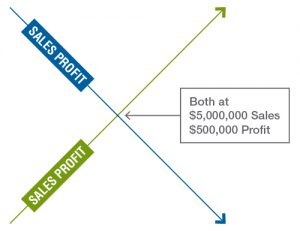

EXCLUSIVE: NAI Business Series with Alf Sanderson*, VP Business Advisory
How much is my business worth?
What is it worth? Before you approach potential buyers or investors, you need to have an idea of the value of your business. Prospective buyers will also assess its value when they consider your proposal. Buyers and sellers will usually have a different perspective of value.
The first step in selling your business, after you have prepared it for sale, is determining how much it is worth. Most valuators will use several methodologies to arrive at the “Fair Market Value” of a business. Fair Market Value is generally described as the monetary consideration that, in an open and unrestricted market, a prudent and informed buyer would pay to a prudent and informed seller, each acting at arm’s length with the other and under no compulsion to act. Businesses rarely change hands at fair market value as price is affected by:
- Special circumstances of the buyer and seller
- Trade-off between cash and terms
- Relative tax consequences for the buyer and seller
The X factor:

Let’s say two businesses have the same revenue and earnings at a particular time, one is trending up in revenue and earnings and the other is trending down. The trend lines meet at the point and time and are exactly the same. Which business is worth more?
Having said that my experience has shown that it is important for a seller or the seller’s broker, to market the business to a large number of potential purchasers. Several times in my career I have had several purchasers interested in a particular business and have received multiple offers resulting in a sale over the original valuation. One must consider that Valuation is sometimes an art more than a science as the valuators experience is a very important part of the process.
Valuation is not an exact science and there are different ways of valuing a business. Each of these methods is based on different assumptions and financial information, which typically results in a different value for each method. For instance, you could base a valuation on the assets of a business (how much it owns) or by considering projected revenues or cash flows. Buyers generally prefer methods based on cash flows.
Most small-to-medium businesses are sold based on a multiple of cash flows. Cash flow is determined by analyzing historic income statements or discounting future cash flows. Cash flows generally are expressed as earnings before interest, taxes and depreciation and amortization (EBITDA) or seller’s discretionary earning. The latter is normally used for smaller companies (generally under $500,000 in earnings) that are typically owned by the manager.
Cash flow is usually measured during a specified, limited period. An experienced valuator will “normalize” the income statement by adjusting items such as excess salary paid to the owner, extraordinary items, and other owner benefits to arrive at the cash flow the business exhibits.
After calculating the cash flow and making the appropriate adjustments, what multiples are used to arrive at the value of your business? Every business has different internal factors and risk profiles that must be assessed when arriving at a value. That is why rules of thumb do not work. My rule of thumb is not to use rules of thumb!
Even similar-sized businesses in the same business sector can have different cash flow multiples. Lease terms, workforce, customer apportionment, market penetration, barriers to entry, trends and management structure are all factors that can affect the multiple. Additionally, there are external factors that must be considered when arriving at a multiple. Regional economics, interest rates, location, market demand for the company’s products and the general health of the industry are all external factors.
In conclusion it is important that your business is valuated by a professional especially one who has been actively involved the sale of businesses and do your best to have the business exposed to multiple potential purchasers.
Click here to download a PDF version
Written by Alf Sanderson*
NAI Commercial
Vice President Business Broker, Mergers and Acquisitions Consultant
604 691 6646
alf@naicommercial.ca
*Personal Real Estate Corporation
Alf has over forty years of industry experience, building and operating businesses, taking companies public and assisting firms in coordinating and selling their businesses. Contact Alf with your questions regarding the disposition of your business.
